Embattled Mexican coach Tata Martino: ‘Things are always fixed by winning’
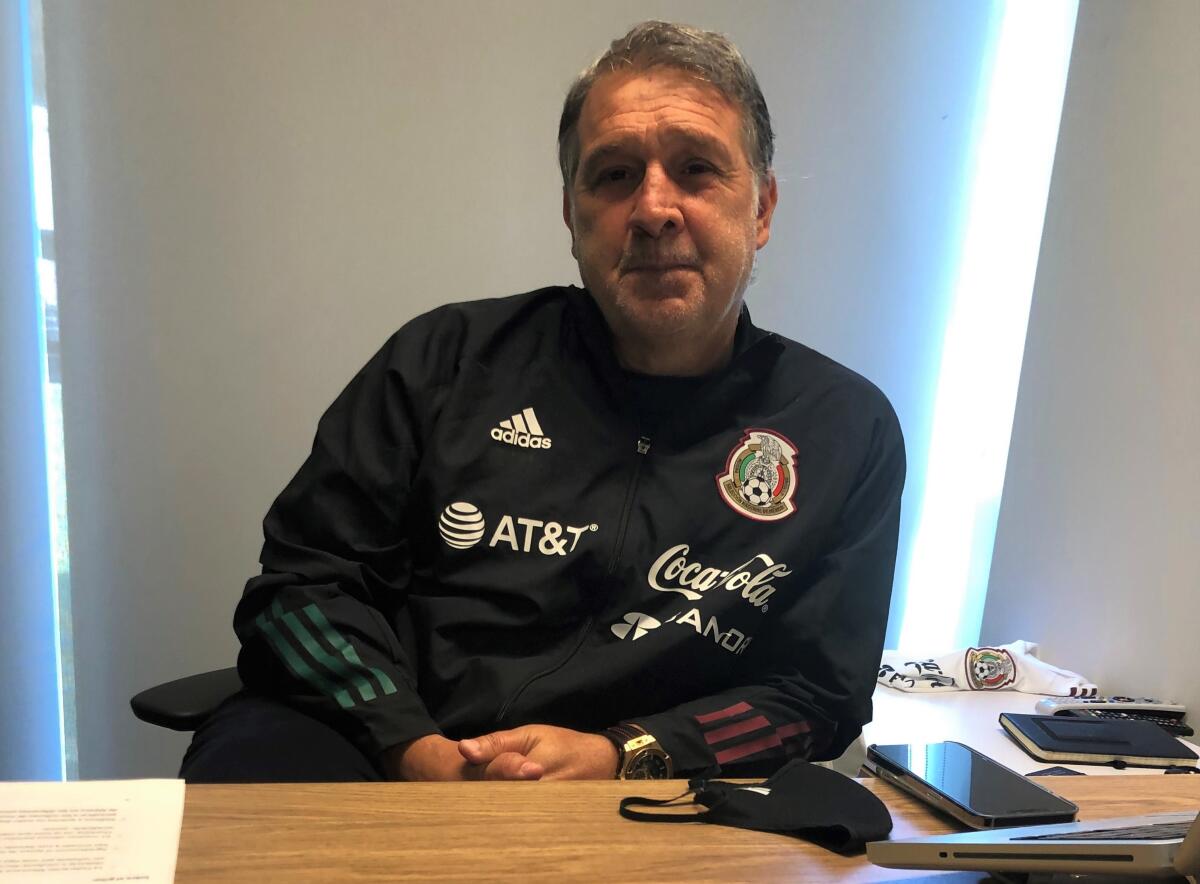
MEXICO CITY — Hello and welcome to the L.A. Times soccer newsletter. I’m Kevin Baxter, The Times’ soccer writer, and we come to you today from Mexico City, where I had a chance Monday to speak with Tata Martino, coach of the Mexican national team, and his boss, Yon de Luisa, president of the Mexican soccer federation.
The past five months have been rough for Martino and El Tri. They lost three rivalry matches to the U.S., falling in the finals of both the CONCACAF Nations League and Gold Cup during the summer, then lost 2-0 (that score sounds familiar, doesn’t it?) to the Americans earlier this month in a World Cup qualifier. That marked the first time Mexico has lost three times to the U.S. in the same year.
It got worse four days later when playing Canada in temperatures well below freezing. Mexico lost again, dropping to third in the qualifying table and marking just the second time Mexico has lost back-to-back qualifiers. Add in an Oct. 27 loss in a friendly with Ecuador, and El Tri will take its first three-game losing streak in four years into next week’s friendly with Chile in Austin, Texas.
However, neither Martino nor De Luisa is ready to panic just yet. Mexico has a plan, they said, and is sticking to it.
“You’re always worried trying to bring the best of your team. We thought that at the end of the year we would have 15 points. We have 14. So we feel positive that we will qualify,” De Luisa said.
“Well, we are in a situation that is not what we expected,” Martino added in Spanish. “We managed 14 points out of 18 possible, but these two consecutive defeats put us in a situation of alert.
“When there are two consecutive defeats, the warning lights go on. The situation is absolutely not the best.”
So how can Mexico fix that?
“Things are always fixed by winning,” he said. “To fix things, you have to win and take advantage of the January and March dates, where in six games we have four at home. That’s the way to fix things. Winning.”
Martino took over an aging Mexican team after the last World Cup and went unbeaten in his first 11 games. But now, with the next World Cup less than a year away, he’s won only two of his last seven and six of his seven losses as Mexico’s manager have come this year.
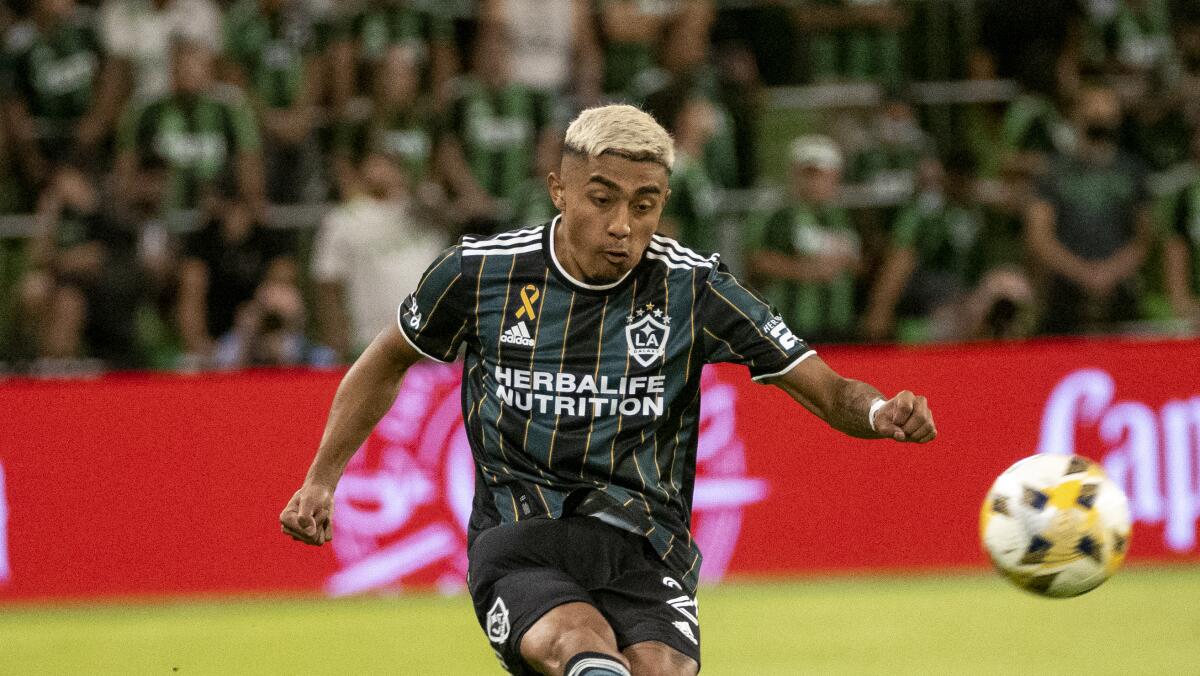
What’s more the team hasn’t gotten much younger, which appears to be something even winning can’t fix. But the regeneration will happen eventually, Martino promised.
“Generation changes occur many times naturally,” he said. “You cannot just discard players without doing an analysis. Being in the national team is not always a question of age. Being in the national team has to do with hierarchy, with players who deserve to be there.
“It is true that Mexico still has players who have been in previous World Cups. But it also has an important group of young players. [Uriel] Antuna, [Roberto] Alvarado, [César] Montes, [Jorge] Sánchez, Carlitos Rodríguez, [Diego] Laínez, [Sebastián] Córdova are all players who have been with us since 2019. Sometimes someone is left out because of their form at the time of the call-up.”
Two young players who are expected to get a call-up for next week’s friendly are Julián Araujo and Efraín Álvarez of the Galaxy. Álvarez made four appearances with Mexico this year, while for Araujo, who petitioned FIFA for a one-time change of allegiance from the U.S. to Mexico last summer, the call-up will be his first with El Tri.
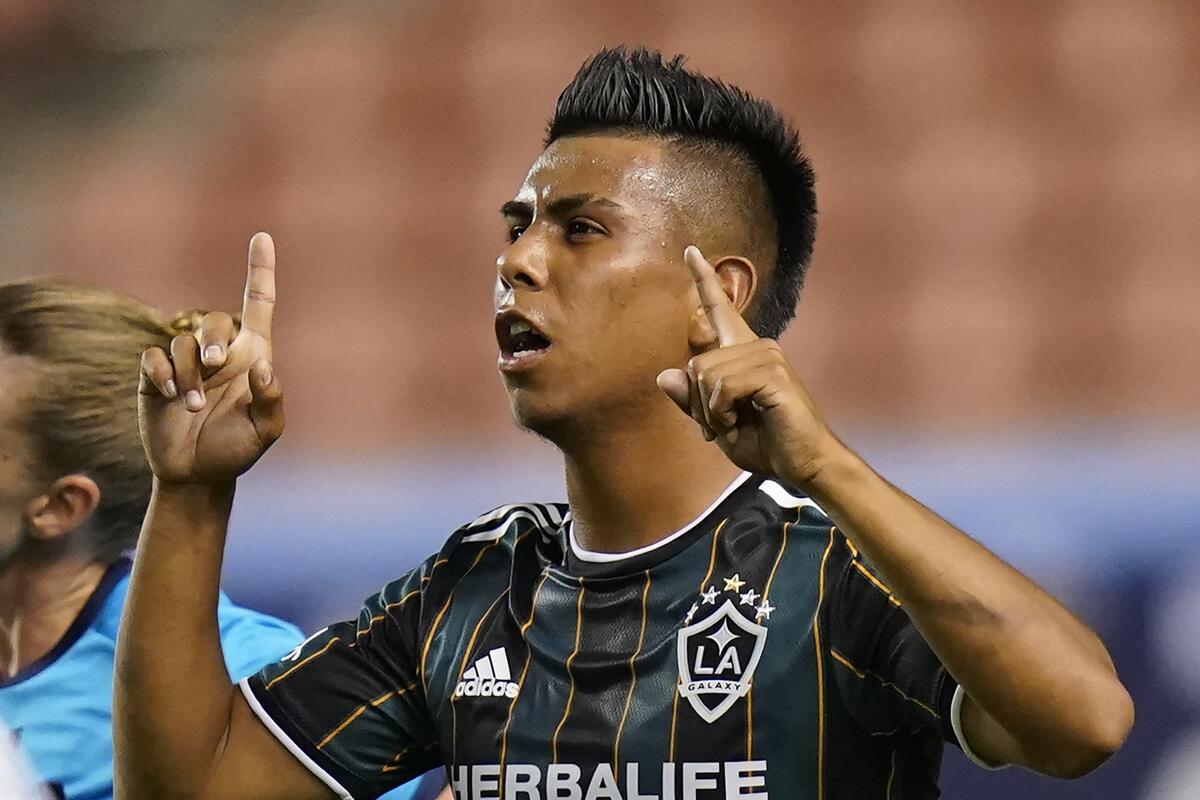
The teenagers, along with goalkeeper David Ochoa, 20, all spurned advances from the U.S. to declare for Mexico this year, but only Álvarez has been called into camp by Martino. Still, the coach pushed back on the suggestion Mexico was stockpiling Mexican American players just to keep them off the U.S. roster.
In some cases, he said, the coaching staff is projecting the players can help Mexico in the future, but they may not have a role right now.
“I really can’t imagine summoning players just so that the United States doesn’t have them,” he said. “If we take them, it’s because we really have expectations. Now, if you ask me if we have to bring him at 17, at 18, at 19, at 20, I really don’t know, because that depends on how their career is going.“
Time, however, may not be on Martino’s side. Mexico has six qualifiers left, including four at home. Two of those — one in February, one in March — are against fourth-place Panama and the second-place U.S., the two teams on either side of Mexico in the qualifying standings. To reach a 17th World Cup — only four countries have played in more — El Tri must finish in the top three in the eight-team tournament or, if it finishes fourth, win an inter-confederation playoff in June.
That leaves little room for error, so while Martino’s job doesn’t appear to be in danger at the moment, it’s hardly safe either. The life expectancy of a Mexican coach, after all, is short, and Martino’s 45 games in charge are already the fourth-most among managers who have had just one stint with the national team.
“The pressure has existed [for me] for 40-odd years. I have had it since I played soccer at the age of 17,” he said. “And I have it today now that I’m 59.”
Enjoying this newsletter? Consider subscribing to the Los Angeles Times
Your support helps us deliver the news that matters most. Become a subscriber.
Chaplow brings OCSC a championship
Four months ago, Richard Chaplow was an assistant coach with a struggling Orange County Soccer Club team that quickly was falling out of the playoff race. He awoke Monday as a national champion after OCSC beat the Tampa Bay Rowdies 3-1 in Sunday’s USL Championship final.
“To win the championship is something we all set out in the season to do. Halfway through it, it was looking unlikely,” Chaplow said. “We’re all very proud of everything we achieved together. Hopefully there are many more to come.”
Chaplow’s rise has been almost as rapid as his team’s. Under coach Braeden Cloutier, Orange County was 7-7-5 following a slide that saw it win just once in eight matches. That cost Cloutier his job in August, with Chaplow taking over in the interim.
That interim didn’t last long; Chaplow was given the team’s permanent managerial post after leading his team to eight wins down the stretch, which got the team to the postseason. Once there, OCSC dispatched three Western Conference foes, the last two wins coming on penalty kicks, to reach the USL championship final.
“The momentum that we brought into the playoffs was huge,” Chaplow said.
Orange County used it to roll over Tampa Bay in a game that wasn’t nearly as close as the final score. Shortly after Orange County keeper Patrick Rakovsky stopped Tampa Bay’s Sebastián Guenzatti’s penalty kick in the 19th minute, Haitian international Ronaldo Damus scored a pair of goals 13 minutes apart to give OCSC a lead that never was threatened.
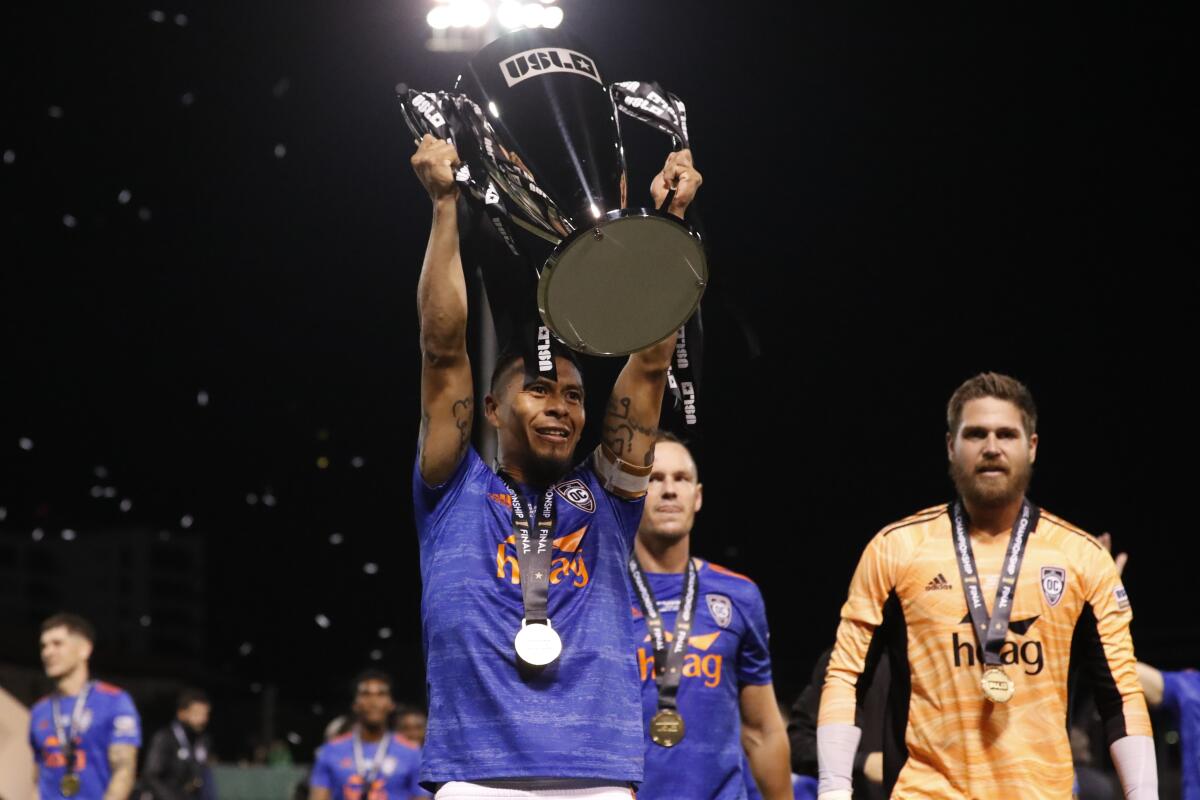
Damus, the championship game MVP, had four of OCSC’s five goals in the playoffs. The only other one came from Mikko Kuningas, who upped his team’s lead to 3-0 just before the halftime break.
Tampa Bay’s lone murmur of protest came from Leonardo Fernandes in the 57th minute, but that was much too little and much too late.
Chaplow was asked what he enjoyed most about the run to the title and talked about the team’s collective effort.
“Just being part of the group really,” he said. “There’s no one person that’s a superstar. There’s nobody that sees themself above anybody. Everybody works together.
“The message I really wanted to get across when I was put in charge was that for us to be successful on the field, we had to be collective off the field. Small little details like that, in my opinion, give you the 1% you need to grind out results and ultimately to compete for a championship.”
The national championship was the first for OCSC, which has been building toward that for a while. The team hasn’t had a losing record in the five full seasons since James Keston bought the team and moved it to Irvine.
“With James coming in and purchasing the club, it gave us a real chance to compete on this kind of level,” said Oliver Wyss, the team’s general manager and president of soccer operations.
Keston smiled at the compliment.
“Mostly I just write checks and cheer for my team,” he said. “We’re growing it step by step. I told Oliver, ‘In five years I want to be in a position to win a championship.’ And he told me it was going to happen.
“I might have been a little doubtful. But we’re here now and the sky’s the limit. This is the foundation, and we just want to build from here.”
Chaplow has given them a pretty good cornerstone to build around.
Galaxy head into 2022 without Te Kloese, Dos Santos
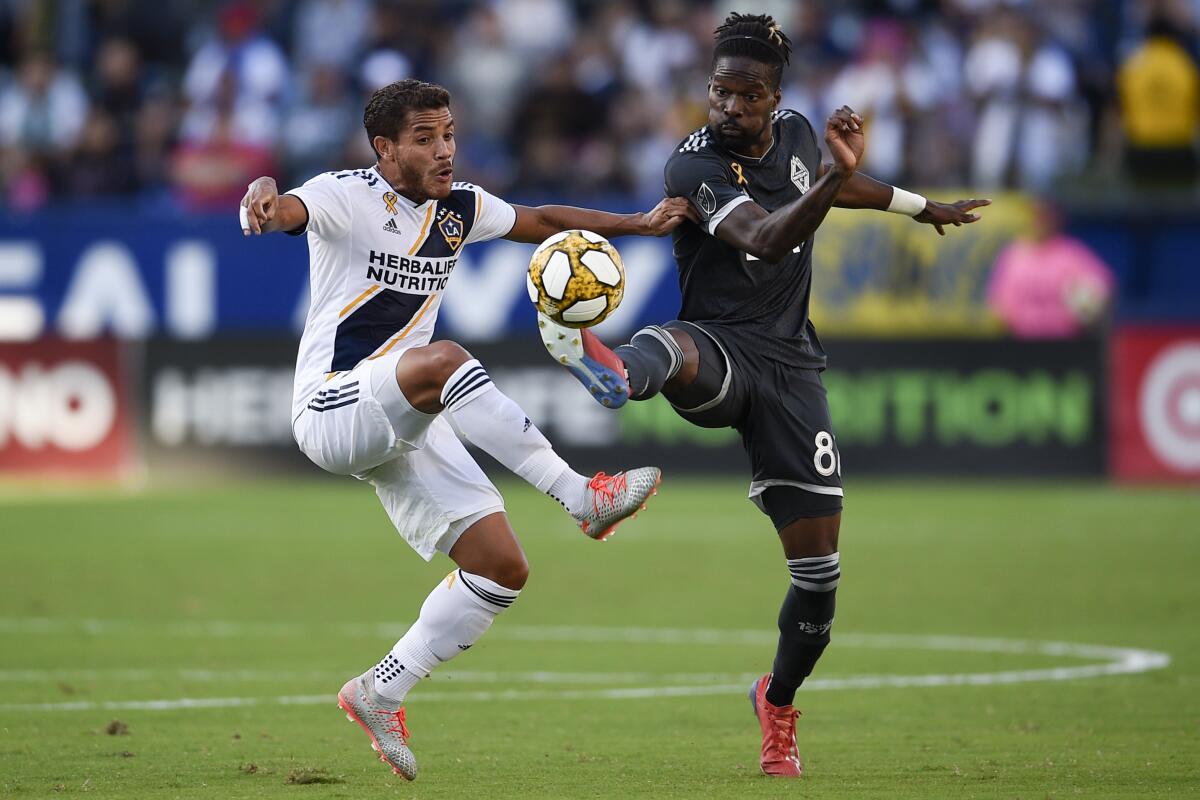
A year ago the Galaxy were a team in transition, one without a manager and about to embark on its third major roster overhaul in three seasons.
They enter this winter without a general manager and with a designated-player spot to fill after declining to offer a new contract to midfielder Jonathan dos Santos.
Yet for president Chris Klein that marks progress.
“As long as I can remember this is the best place we’ve been in in an offseason,” he said. “Greg loves what he has and knows what he needs.”
Greg would be Greg Vanney, the man Klein hired to fill that coaching vacancy last year. Vanney then brought in 16 new players, who spent much of last season getting to know each other.
That won’t be an issue in 2022.
“They’re looking at a couple positions. Not a lot,” Klein said of the winter wish list for Vanney and his staff.
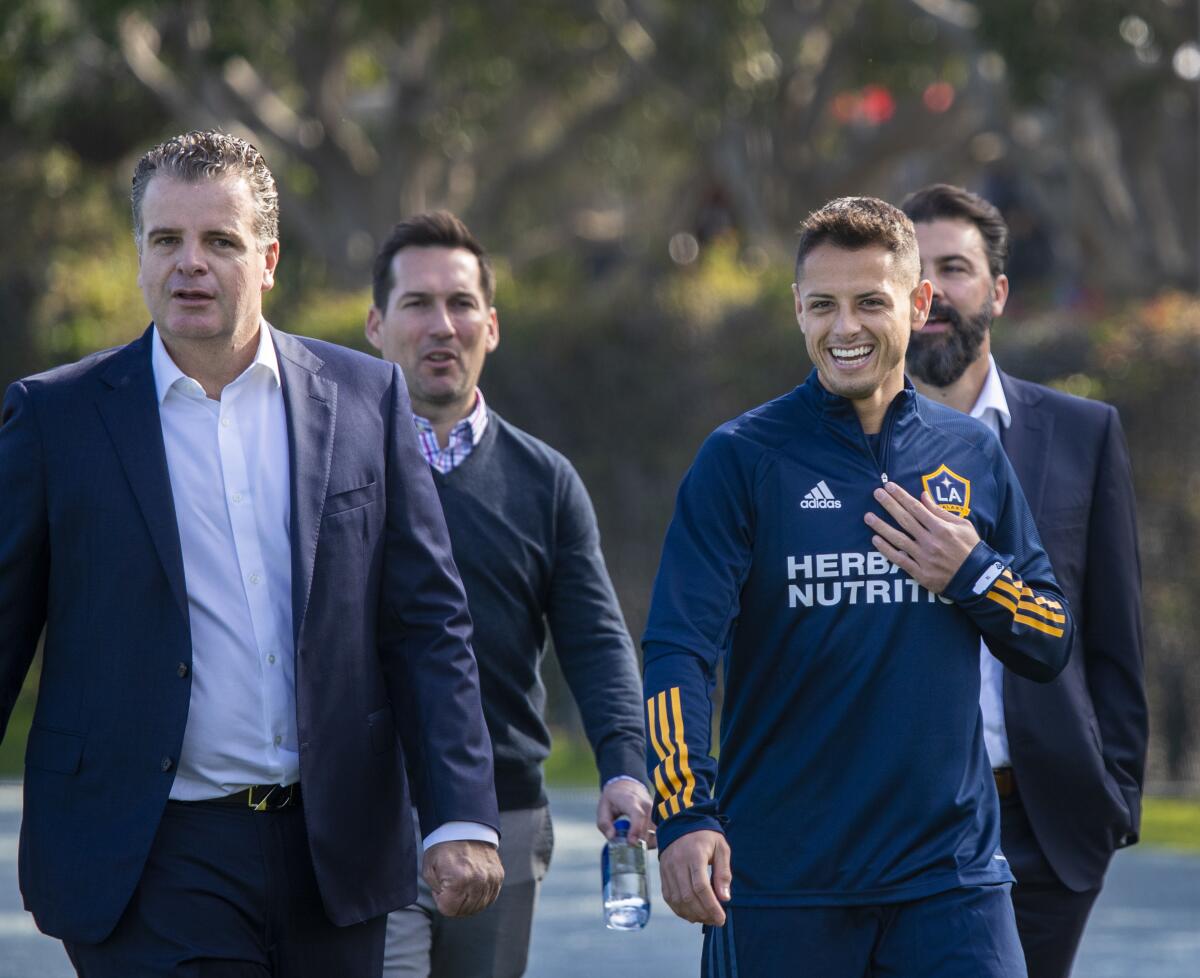
With the departure of Dennis te Kloese, the former general manager who left after three seasons to become CEO of Feyenoord of the Dutch Eredivisie, Vanney will have final say over player-personnel decisions, as he did when he was manager and technical director in Toronto. The Galaxy have not said how they will reorganize their front office beyond that.
Also gone is the 31-year-old Dos Santos, the team captain. The Mexican international joined the team midway through the 2017 season and became the 30th player in club history to appear in 100 or more regular-season matches. He made 103 appearances, including 91 starts.
But he has seen his production decline in the last two years, when he missed nearly a third of the Galaxy’s 56 games to injury and/or international duty. And with his $2-million contract the second-highest on the team, the Galaxy concluded they can make better use of that money and the DP spot that went with it.
Beyond that, the roster largely is set, with the status of veteran midfielders Victor Vázquez and Sacha Kljestan the biggest issues.
The Galaxy did not exercise Vázquez’s option, but negotiations on a new deal are underway. Vázquez made 28 appearances and 21 starts in 2021. Kljestan, whose contract has expired, made 31 appearances last season, his most since 2017, and scored five goals — three of which were either game-winners or put the Galaxy ahead to stay.
As valuable as their contributions were on the field, their leadership in the locker room was even more important. And with Dos Santos leaving, Kljestan and Vázquez could play even bigger roles next year despite the fact they will be 36 and 35, respectively, on opening day.
As for the rest of the team, the Galaxy declined options on forwards Ethan Zubak, Kai Koreniuk and Augie Williams, goalkeeper Eric Lopez and defenders Daniel Acosta and Oniel Fisher, while the loan for defender Niko Hamalainen expired. He will return to Queens Park Rangers of the English Championship.
Also out of contract and unlikely to return is backup goalkeeper Justin vom Steeg.
Options, meanwhile, were exercised on goalkeeper Jonathan Klinsmann, defenders Nick DePuy and Daniel Steres and midfielders Daniel Aguirre and Adam Saldaña.
For Revolution, the waiting is the hardest part
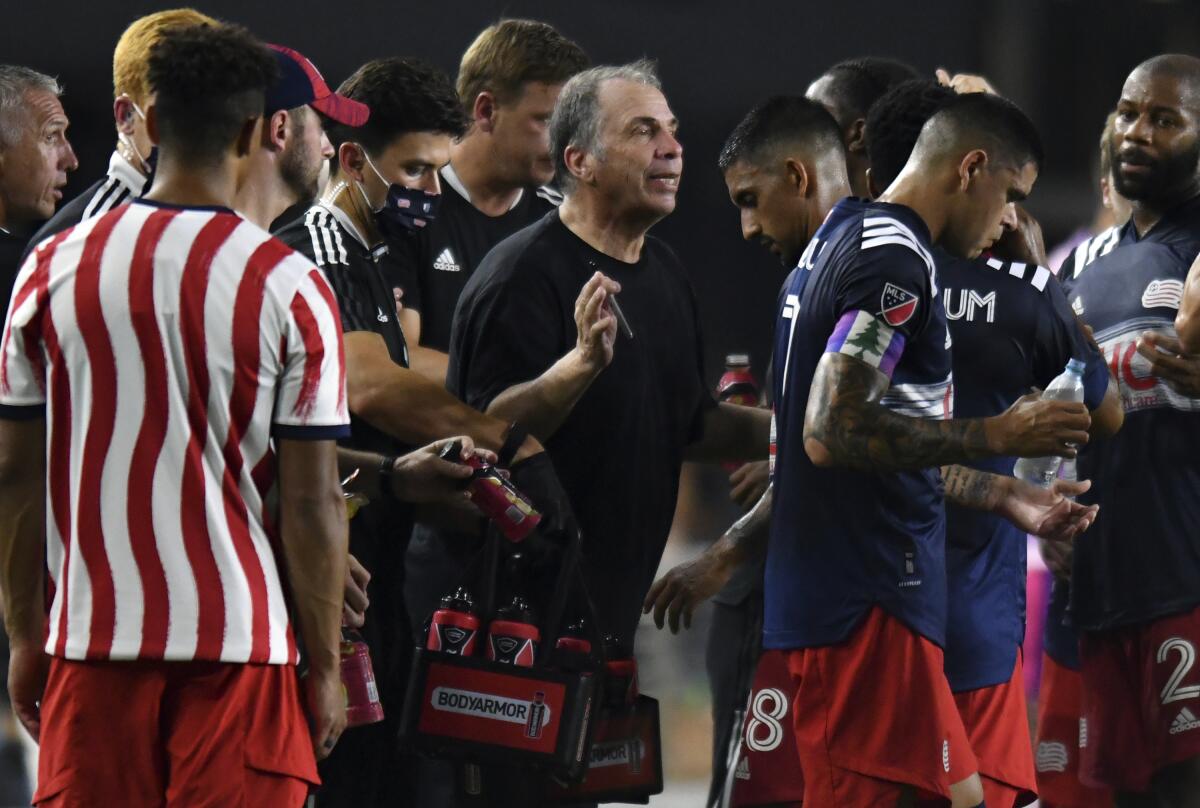
Bruce Arena knows his way around the MLS Cup, having taken the Galaxy to three titles in eight full seasons in Carson. But his efforts to get the New England Revolution their first championship have been made more difficult by the schedule makers, who delayed the team’s first playoff game until Tuesday.
New England, which averaged a game every six days during the regular season, has played just once in the last month and appears to be getting punished for its success. The Revolution broke the single-season record with 73 points, which earned Arena a record fourth MLS coach of the year award Monday and secured the team not only the Supporters’ Shield, but also a first-round playoff bye, the reason for the unusually long gap between games.
Colorado, which had the Western Conference’s first-round bye, played its first postseason game on Thanksgiving Day, five days before the Revolution will play theirs. And New England not only will be the last team to play a postseason game, but by the time it kicks off against New York City in the Eastern Conference semifinals five other teams already will have played twice.
If New England wins, it will have just four days to prepare for the conference final with Philadelphia, a team it’s already beaten twice this season.
The playoffs already have provided a couple of surprises with Colorado, coming off the best regular season in its history, falling to Portland on a goal in the final minute of regulation. Seattle, which hasn’t lost a playoff game at home since 2013, was eliminated by Real Salt Lake on penalty kicks.
Perhaps the Colorado loss wasn’t a surprise — which would be a bad omen for New England. According to Brian Straus of Sports Illustrated, of the 22 teams that finished atop the conference standings in the last 11 seasons only two advanced to the MLS Cup final.
Podcast
Don’t miss my weekly podcast on the Corner of the Galaxy site as co-host Josh Guesman and I discuss the Galaxy each Monday. You can listen to the most recent podcast here.
Quotebook
“Respect is fundamental. Respect for everyone, for a journalist, for rivals. Obviously, I have respect for the United States because I know from within the evolution of MLS. I also know many of the players who are in the national team.”
Mexican manager Tata Martino, on whether he his team has respect for the U.S., something the Americans questioned after they beat El Tri earlier this month
Until next time...
Stay tuned for future newsletters. Subscribe here, and I’ll come right to your inbox. Something else you’d like to see? Email me. Or follow me on Twitter: @kbaxter11.




